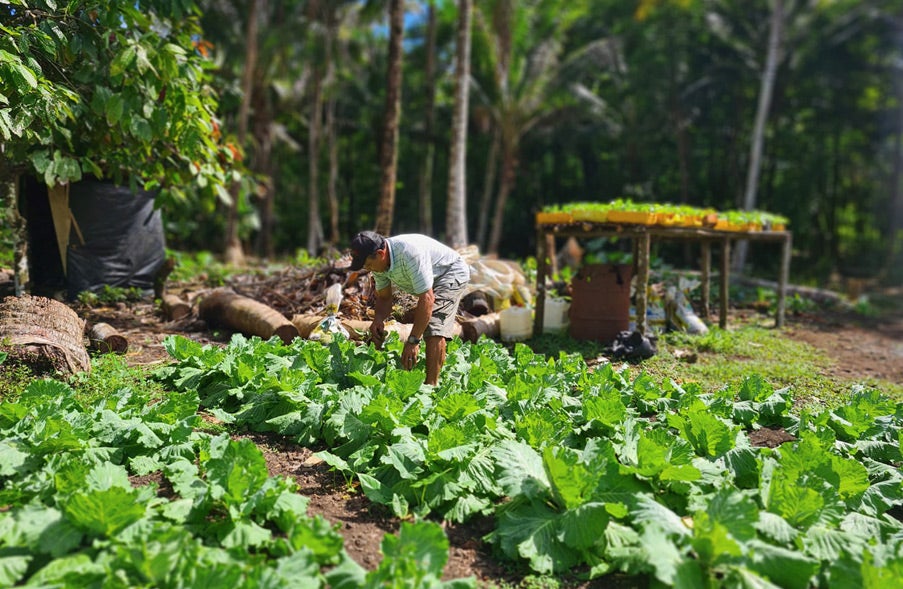 Samoa is blessed with nutritious local vegetables, but reducing import costs could make imported favorites more affordable and widely available as well. © Samoa Agriculture and Fisheries Productivity and Marketing Project - SAFPROM
Samoa is blessed with nutritious local vegetables, but reducing import costs could make imported favorites more affordable and widely available as well. © Samoa Agriculture and Fisheries Productivity and Marketing Project - SAFPROM
Changing habits can be hard, but it becomes easier when the motivation is a healthy family. In Samoa, the Government, with support from the World Bank, is using taxation to encourage healthier lifestyle choices for its people.
For example, excise taxes have been added to products like cigarettes, sugary drinks, salty snacks, and selected fatty meats. The Government has also been considering reductions in import duties on healthy options like vegetables, fresh chicken, and bottled water to make them more widely affordable.
Recently, we collaborated with government ministries, a local non-government organization Lutia i Puava Ae Mapu i Fagalele, and researchers from the Obesity, Lifestyle and Genetic Adaptations (OLaGA) research center to conduct the Samoa Food and Tobacco Household Survey to establish baseline data around attitudes and behaviors relating to food, drinks and smoking. In the process, we learned a lot about the consumption habits of Samoan families. Some of what you’re about to read may be common knowledge, but we also discovered a few surprises.
Making healthy eating a cheaper option
Firstly, almost every participant in the study felt they understood the importance of good nutrition. The survey found Samoans are interested in preparing healthy food for their families, and almost all respondents said that at least some of the people in their community had been making an effort to eat more healthily. Interestingly, this was despite most people saying that eating healthily took more effort; underscoring the idea that they would try to eat better if the benefits were clear.
Frozen chicken was easily the most regularly eaten meat, according to the survey, with over 90% of people surveyed eating it at least once a week. Fish was also a popular weekly choice (54%), ahead of fresh chicken (16%), pork (12%), and beef (7%).
With these consumption behaviors clearer, one proposal is now to reduce the import duty currently being paid on healthy vegetables that are brought into the country. Samoa is already blessed with nutritious local vegetables like taro and breadfruit, but reduced import costs could help make imported favorites like garlic — currently eaten weekly by 32% of respondents — carrots (19.6%), cabbages (19.5%), and broccoli (1%) more affordable and widely available.
We also wanted to understand what might stop people preparing more healthy meals. Eighty percent of respondents said there was no one in their house who knew how to prepare a tasty meal with imported vegetables, 18% said they didn’t know enough about which foods were healthy, 23% felt healthy options were unavailable where they lived, and 37% reported not liking the taste. By far, the biggest barrier to healthy eating was the cost; 80% reported feeling that healthy food was more expensive. Clearly, this indicates the potential for the Samoan government and other partners to help consumers better understand what makes healthier eating a cheaper option.
Unhealthy drinking habits
The survey confirmed Koko Samoa, a traditional drinking chocolate, as the most commonly consumed drink in the country, with 78% saying they had it at least once a week. Also popular was tea/coffee with cream and sugar (57%), black tea/coffee (37%), and bottled water (21%).
On the less healthy side, sweetened fruit drinks were consumed by 22%, followed by Milo (13%) and soft drinks (12%). Perhaps unsurprisingly, overall consumption of these less healthy options was highest in the urban center of Apia and most likely in the 18-29 age group. In general, those aged below 65 tended to add significant amounts of sugar to their hot drinks while those aged over 65 were more likely to drink their tea or coffee without sugar.
Discouraging smokers
Among all those surveyed, 36% of men and 10% of women reported smoking tobacco with those 30-64 years most likely to have the habit.
One in four smokers we surveyed said they had reduced their tobacco consumption in the last year. Health was the most common reason given for cutting back by those in the 18-29 year age group, something the great educational campaigns the government has been running in recent times must be at least be partly responsible for. Price increases were the most common reason for those in the 30-64 bracket. For those over 65, an equal number cited price increases and health concerns as their reason for smoking less.
We used a tool that simulates price rises for cigarettes and found that further increases in the cost of manufactured cigarettes is likely to drive consumption down. We found that a 7% increase in the current price would lead to one third of smokers stopping and if the current price was doubled, most respondents said they would quit. This elasticity indicates a strong argument for higher taxes on cigarettes to reduce consumption.
Healthier choices
Tax policies are just one of many ways in which Samoa is addressing the burden of non-communicable diseases. The government plans to use this survey as a baseline to assess the impacts of future health-focused policies which complement a suite of actions to encourage healthier habits and improve health outcomes for all Samoans.
The work was funded by the Japan Trust Fund for Scaling Up Nutrition and the Advance UHC Multi-Donor Trust Fund. The Advance UHC trust fund is managed by the World Bank and aims to drive the more equitable expansion of universal health coverage across East Asia and the Pacific. Funders include the Australian Government, GAVI, The Global Fund, and the Bill and Melinda Gates Foundation.




Join the Conversation